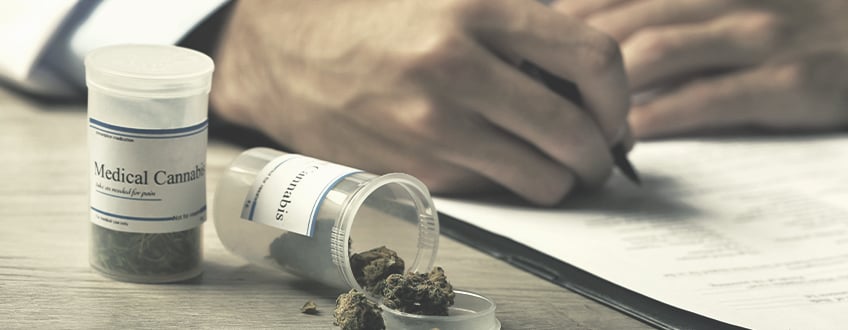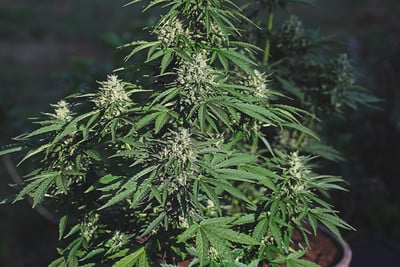.

Cannabis and Post-Surgery Pain
How effective is cannabis at relieving post-surgery pain? And how does it stack up against opioids and other pain medications in terms of effectiveness, accessibility, and side effects? Read on to learn more.
These days, cannabis has many applications. Apart from its usual recreational purposes, the magic herb is beginning to gain scientific credit for its potential health and wellness-promoting attributes. Just by looking at published research over the last few decades, you’ll find quite a lot of literature on it.
For this article, we’ll talk about how cannabis could be effective for pain relief after major surgery. Is it a better alternative to over-the-counter medication? Or are we better off with opioids and other pharmaceutical drugs?
Contents:
We’ll delve into this topic by going through what the scientific research says, as well as the other options people opt for. If you’re considering CBD or THC to alleviate your post-op pain, this piece should begin to answer your questions.
Current Treatments for Post-Surgery Pain
Not all surgeries are a smooth process. Some procedures are a bit aggressive, but you end up doing fine afterward; other surgeries will leave you aching like you just went through a six-round boxing match.
Before cannabis legalization, doctors were inclined to prescribe several options for pain relief; some of them drug-induced, others not.
The type of treatment one undergoes depends on the type of surgery, as well as one's pain tolerance. Most of these forms of treatment are generally safe, but all drug-based treatments can have side effects like nausea, drowsiness, and vomiting.
Local Anesthetics
Anaesthetics numb a particular portion of the body for a short period of time. Some of them can be administered by subcutaneous injection, while others come in the form of a topical medication like drops or creams.
In some cases, nerve blocks are offered to patients who find their pain to be unbearable. Similar to most anesthetics, a nerve block desensitises the particular region of the body from which the pain radiates. It is usually administered through a catheter.
What’s great about nerve blocks is that they lessen the amount of opioid medication administered. That means fewer, less intense episodes of nausea, drowsiness, and other side effects.
Regional Anaesthetics
In some cases, nerve blocks are offered to patients who find their pain to be unbearable. Similar to most anaesthetics, a nerve block desensitises the particular region of the body from which the pain radiates. It is usually administered through an injection.
What’s great about nerve blocks is that they lessen the amount of opioid medication administered. That means fewer, less intense episodes of nausea, drowsiness, and other side effects.

Nonsteroidal Anti-Inflammatory Drugs (NSAIDs)
You’ve likely taken some ibuprofen for a really bad toothache or some aspirin to rid yourself of a migraine.
All of these are nonsteroidal anti-inflammatory drugs (otherwise known as NSAIDs), and, as the name suggests, are used primarily to reduce inflammation. You can purchase them even without a prescription.
The main advantage of taking NSAIDs is that they do not cause any cognitive impairment. But there are possible side effects, such as increased blood pressure and digestive issues, to consider. They can also pose a problem for those suffering from asthma, stomach ulcers, or those taking blood thinners.
Even with the accessibility of NSAIDs, it would still be best to consult a professional before using them.


Relaxation Techniques
For those who aren’t a fan of loading their bodies with drugs, there are relaxation techniques to help alleviate post-surgery pain.
One good example is guided imagery, wherein you draw up a calm, soothing image in your mind. The purpose of this technique is to provide you with a pleasant distraction from the pain, therefore reducing its intensity.
Non-drug remedies, like cold or heat therapy, also work to reduce the swelling and make the pain more manageable.

Non-Opioid Analgesics
If you’re dealing with mild to moderate pain that you no longer want to feel, analgesics are the way to go. They are often effective on their own and lessen the need to take other medications, thus reducing the potential for side effects.
Like NSAIDs, most analgesics are safe for consumption. You can purchase them from your local drug shop without the need for a prescription.
One thing you will have to watch out for, however, is possible liver or kidney damage if you go over the prescribed dosage.

Opioids for Post-Surgery Pain Relief
Certain opioids are commonly used to relieve post-surgery pain. Those experiencing intense pain are usually prescribed these medications.
Upon taking these drugs, they bind to opioid receptors mainly situated in the brain and spinal cord. Signals are then sent through the entire body, telling it that it’s not in pain. The biggest advantage of taking opioids for pain relief is that the effects are almost immediate. Agony is replaced by a distinct and sometimes moderately euphoric feeling. But like any other synthetic and semi-synthetic drugs, the drawbacks can be punishing, especially when abused.
Physical Side Effects of Opioids
Besides pain relief, opioid users are prone to experiencing physical side effects. Some people experience drowsiness, while others go through bouts of constipation. Some may brush these side effects off as a normal occurrence, but experiencing such symptoms first-hand is not a comfortable situation, especially after a surgery.

Tolerance and Withdrawal
The more frequently you take opioids, the easier it is for your body to build a high tolerance to them. So, what do you do? You increase your dosage to feel the same effects.
The withdrawal symptoms that occur after suddenly stopping opioid intake aren’t at all fun. They involve muscle pain, nausea and vomiting, and abdominal cramps, to name but a few.
If you decided to abruptly quit the opioid treatment, you’re in an ugly irony wherein the drugs that are supposed to provide relief actually cause you these excruciatingly uncomfortable moments.
Mental and Behavioural Changes
Prolonged opioid use will lead to the body’s dependence on these drugs. The brain stops its production of certain hormones and neurotransmitters, and instead relies on the opioids to do the work.
The result? The brain also begins to respond to the environment differently. Certain cues and triggers may remind the person about the drug, which ultimately builds up an unwanted craving.
That dependence also tends to lead to desperate acts just to get the fix. It could be stealing money from family members or other crooked acts. Luckily, that is not a common occurrence among opioid users when they are perceived by patients as a medication and not as a recreational drug.
What Does Research Say About Cannabis for Pain?
Now, let’s get into the meat of the matter. How exactly does science view medical cannabis for post-surgery pain?
As it is with other findings on cannabis, experts have found some positives and some negatives.
Medical Cannabis for Pain Control
In one study conducted in 2008, researchers found a connection between cannabis and pain control.[1] The link? Our body’s endocannabinoid system (ECS).
See, when THC or CBD enter the body, they interface with cannabinoid receptors within the ECS. The activation of these receptors theoretically could have the potential to produce analgesic and anti-inflammatory effects that relieve pain and reduce hyperalgesia (abnormally heightened pain sensitivity). Those who suffer from fibromyalgia and migraine are all too familiar with it.
That’s not all. THC can also modulate both dopamine and serotonin levels, which could also help in pain reduction.
Ongoing studies are also testing CBD[2] (a non-psychotropic cannabinoid) in cell and animal models of inflammation to see if it has a future role to play in this area.

Medical Cannabis to Lower Painkiller Use?
The side effects of opioids aren’t the only issue. Another major issue is the accessibility to such drugs, and the ease with which they can be misused and abused.
However, recent studies[3] show how medical cannabis could potentially lower the likelihood of opioid use. One study observed that 82% of 1,000 respondents taking cannabis to manage pain were able to either reduce or completely stop taking over-the-counter pain medication. Another 88% were able to quit opioid painkillers completely.
In some cases, people resort to medical cannabis to avoid the eventual unpleasant side effects brought on by certain medications. But ultimately, and depending on the case, controlled use of marijuana for therapeutic purposes could allow patients to experience relief with less, or even without, opioids. Therefore, the chances of developing a tolerance to and dependence on opioid drugs are significantly lessened.
Medical Cannabis as a Possible Gateway to Opioid Use
On the flip side, the negatives of medical cannabis use also need to be taken into account. As this 2016 retroactive pilot study[4] shows, chronic marijuana consumption may lead to eventual opioid use.
The study involved motor vehicle crash patients in Colorado and Texas hospitals, and ultimately concluded that chronic cannabis use possibly affects the pain response by requiring higher doses of analgesic opioids to achieve relief.
However, it is worth noting that these findings were specifically seen in chronic users. Episodic users showed no differences in their desire to use opioids.
Opioids vs Cannabis for Post-Surgery Pain Relief
On paper, there is a compelling argument behind medical cannabis for post-surgery pain relief. But, if you look at it side-by-side with opioids, things become a bit more complex.
Addiction Tendencies
Opioids and marijuana have a high likelihood of excessive use. Despite being a bit different, both induce a euphoric sensation, which makes them susceptible to addiction and chronic consumption. However, withdrawal symptoms from opioids are definitely much more unpleasant.
On the other hand, cannabis could be seen as an alternative for opioid use in some patients. Most notably, its side effects are less disturbing, and the threat of lethal overdose is basically non-existent.
Accessibility
Here’s where opioids have a bit of an upper hand. Regardless of where you are in the world, these drugs are available for purchase as long as you have a doctor’s prescription.
That isn’t the same case with cannabis, which is still considered a “dangerous” substance in many countries, and warrants hefty punishments for possession, growing, and sale. It also remains a Schedule I drug in the United States, alongside ecstasy, heroin, and LSD. Simply put, the government has deemed these substances to have “no accepted medical use” and a “high potential for abuse”.

The Process of Pain Relief
There is a difference in how cannabis and opioids provide pain relief. If you remember reading about it in an earlier section of the article, opioids interfere with nociceptive neurons, resulting in the feeling that the body isn’t hurt. This happens immediately after the drugs bind to the distinct opioid receptors.
The process with cannabis is slightly different. Here, CB2 receptors appear to be implicated. The activation of these sites could reduce the sensation of pain via other not well-understood mechanisms, though potentially less effectively than opioids.
Should You Use Cannabis for Post-Surgery Pain Relief?
There are at least two schools of thought in this discussion. One group of people will prefer cannabis because, unlike opioids, its side effects are generally much less severe. On the other hand, another group would go for opioids because of its accessibility and the legal issues surrounding marijuana.
Cannabis does have therapeutic promise, but it can also present some complications, depending on what type of surgery you had. Smoking, for instance, is definitely a no-no if the procedure relates to anything with the respiratory system.
More research is needed in regard to using cannabis to reduce post-surgery pain, but current findings appear promising. Moreover, the herb appears relatively safe to use before and after surgery. However, more studies should be conducted in this regard.
To be on the safe side, it would be wise to consult your doctor before taking cannabis post-surgery.
Medical DisclaimerInformation listed, referenced or linked to on this website is for general educational purposes only and does not provide professional medical or legal advice.
This content is for informative purposes only. The data are extracted and gathered from external sources. Royal Queen Seeds and associated personnel are not responsible for the use or interpretation of the provided information.
- Cannabinoids in the management of difficult to treat pain https://www.ncbi.nlm.nih.gov
- Antioxidative and Anti-Inflammatory Properties of Cannabidiol https://www.ncbi.nlm.nih.gov
- Could marijuana be an effective pain alternative to prescription medications? -- ScienceDaily https://www.sciencedaily.com
- The grass is not always greener: a multi-institutional pilot study of marijuana use and acute pain management following traumatic injury - PubMed https://pubmed.ncbi.nlm.nih.gov







































